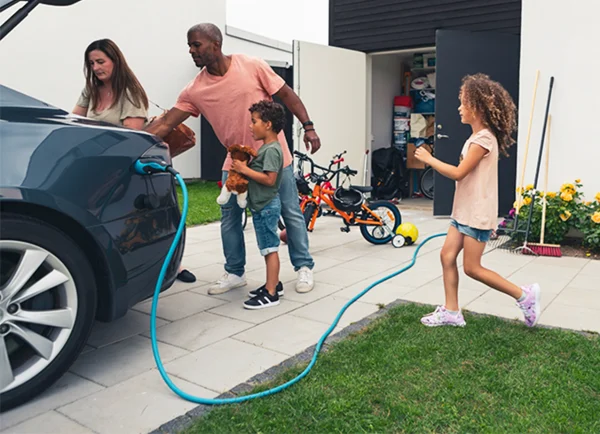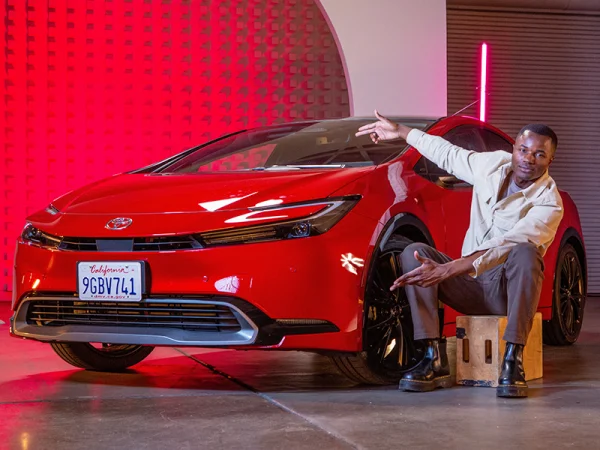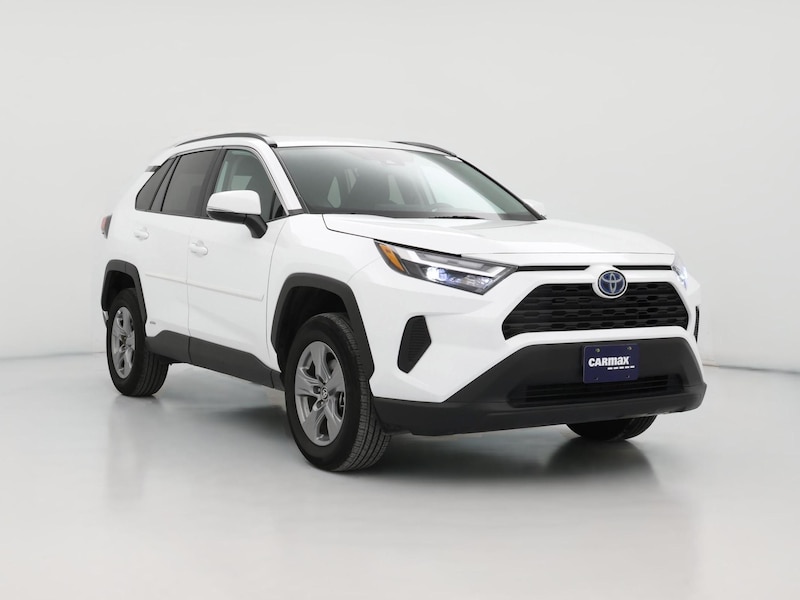
Hybrid vehicles
Hybrid cars use a battery pack and one or more electric motors to supplement a traditional gasoline engine, increasing fuel efficiency—check out our listings of the top used hybrid models below.
What to know about hybrids
Hybrids explained
All hybrids operate like they have two motors—one runs on electric power, and one on gas—but there are key differences between traditional hybrids (HEVs) and plug-in hybrids (PHEVs):
HEVs | PHEVs | |
|---|---|---|
Motor | Uses a combo of both gas and electric | Uses a combo of both gas and electric |
EV mode | 1-2 miles (depending on model) before gas motor kicks in | 15-40 miles (depending on model) before gas motor kicks in |
Driving | Some models allow ability to choose whether to run on gas, electric, or both, but some do not | Provides drivers ability to choose whether to run on gas, electric, or both† |
Charging | Never plug in; can leverage regenerative braking and/or draw excess power from gasoline engine | Can plug in, leverage regenerative braking and/or draw excess power from gasoline engine |
Battery | Smaller battery with less EV power and lower weight | Larger battery with more EV power and higher weight |
† As noted, PHEVs provide drivers the ability to choose whether to run on gas, electric, or both. If you're not into guesswork though, you're in the clear—all PHEVs feature software to optimize which power source you use to provide the most efficient driving.
If you're looking for a deeper comparison of compare hybrid, electric, and gas, explore fuel types & powertrains to learn more about the engine choices for your next vehicle.
Best hybrid cars
If you're looking for a hybrid car, you're in luck, as there's a wealth of great used hybrids out there from capable SUVs to small hatchbacks that are perfect for city life.


1. Toyota Prius
CarMax owner rating

2. Toyota RAV4 Hybrid
CarMax owner rating
Pros
Excellent fuel economy estimates
Smooth ride
Good cargo capacity
Cons
Uncomfortable front seats
Mushy brake pedal
Unpleasant engine noise

3. Toyota Highlander Hybrid
CarMax owner rating
Pros
Welcome hybrid fuel figures
Generously equipped with standard and available driver assistance
Pleasant ride experience
Cons
Tight third-row dimensions
Prominent engine noise at full power
Limited cargo space
Best AWD hybrid cars
An AWD car brings immense confidence to handle any road condition. All of these vehicles have AWD as available or standard.


1. Toyota Highlander Hybrid
CarMax owner rating
Pros
Welcome hybrid fuel figures
Generously equipped with standard and available driver assistance
Pleasant ride experience
Cons
Tight third-row dimensions
Prominent engine noise at full power
Limited cargo space

2. Lexus NX 300h
CarMax owner rating
Pros
Great hybrid powertrain
Spacious cabin
Peaceful, even at highway speeds
Cons
Infotainment touchpad is far from effortless
Limited cargo cubes

3. Lexus RX 450h
CarMax owner rating
Pros
Plenty of rear passenger space
A quiet and comfortable interior
A capable hybrid powertrain
Cons
Trunk space is smaller than competitors
Touchpad infotainment controls are a distraction
Slower acceleration than most hybrids
Hybrid SUVs
With many models to choose from, purchasing a used hybrid SUV is a smart way to get more miles from a tank.


1. Toyota RAV4 Hybrid
CarMax owner rating
Pros
Excellent fuel economy estimates
Smooth ride
Good cargo capacity
Cons
Uncomfortable front seats
Mushy brake pedal
Unpleasant engine noise

2. Toyota Highlander Hybrid
CarMax owner rating
Pros
Welcome hybrid fuel figures
Generously equipped with standard and available driver assistance
Pleasant ride experience
Cons
Tight third-row dimensions
Prominent engine noise at full power
Limited cargo space

3. Kia Niro
CarMax owner rating
Pros
Great seating and cargo space
Standard tech including wireless smartphone connectivity
Fuel-sipping powertrain
Cons
Just one engine, and it's a bit slow
Front-wheel drive only
Can have a rough ride depending on the surface
Research hybrid models
FAQs about hybrid vehicles
Hybrid vehicles pair a battery pack and at least one electric motor with a gasoline-powered engine. The battery pack is charged by harvesting energy from the gas engine and regenerative braking, which then powers the electric motor to help with acceleration and low-speed driving where electric motors are more energy efficient than gas engines. This leads to greater overall efficiency than comparable gas-only vehicles.
“Hybrid” most generally refers to a hybrid electric vehicle (or HEV), one which uses a gasoline engine and at least one electric motor for power, but which does not need to be plugged in to charge. They offer significant improvements in fuel efficiency over similar gas cars.
A “mild hybrid” is very much like a traditional gasoline car with a more powerful electrical system that relieves some of the engine’s load. Mild hybrids offer slight efficiency gains over traditional gas cars.
A plug-in hybrid (or PHEV) uses a larger battery and more powerful electric motors–it can be plugged in and charged up and is able to drive on electric power alone. Depending on how you drive it, a PHEV can run on very little gas.
Because they need battery packs, hybrid cars tend to weigh more and cost more than similarly-sized gasoline cars. These battery packs will also need to be replaced eventually as their capacity diminishes over time, which can be a significant added cost for high-mileage hybrids.
Although the Toyota Prius has earned a spot as the poster child for hybrids, choosing the best hybrid depends on your needs. Currently there are hybrid sedans, hatchbacks, SUVs and even trucks. Luxury and performance hybrids and plug-in hybrids are also available. Basically, any vehicle category you could be shopping in likely has a hybrid of some sort available.
The most common mild hybrids use a small electric motor that acts as a starter and generator, and can provide some extra assistance to the engine. Mostly, the stronger electrical system improves efficiency by running accessories like the air conditioning pump and water pump that are traditionally driven by belts, taking some load off the engine. They don’t rely on their electric motors for acceleration, like hybrid electric vehicles do.
Energy must be used to get any vehicle up to speed, and typically that energy comes from either a fuel source or battery pack in your car.
With a traditional braking system, pushing your foot on the pedal triggers the brake components to compress together, creating resistance to slow your vehicle's wheels. Any energy you had used to get up to speed is then lost as heat.
With a regenerative braking system, your wheels are connected to a motor that recaptures some of the energy used to get your vehicle up to speed, which is then converted back to stored power in the battery—hence the name 'regenerative'.
Most electric vehicles, including full EVs, HEVs, and PHEVs, feature both braking systems and allow you to select whether to use both or only regenerative braking. Because most regenerative braking systems kick in immediately after releasing your accelerator pedal (no need to apply the brake pedal) you can drive while using your traditional brakes significantly less often; this is commonly called one-pedal driving.
What is a hybrid car?
Hybrid cars have changed a lot over the years. Today, what a hybrid car means is something with a powerful engine, brisk acceleration, and sharp styling too. Check it out as Desola Bagolun busts some common myths that just no longer apply to modern hybrid cars.
Ready to find your hybrid?
Research other alternative fuel options
We hope you found this information helpful. This content is intended to inform and is not meant to provide legal, financial or investment advice. We make every effort to provide accurate information, but please verify before transacting and consider talking to a qualified professional about your unique circumstances.
Statements of fuel economy or EV range are based on EPA and other third-party estimates for vehicles when new. Fuel economy and EV range will degrade with time and vary based on age, driving conditions, vehicle history, and other conditions. See fueleconomy.gov for more info.
Editorial content contained on this page comes from Edmunds.com, Inc., a subsidiary of CarMax Enterprise Service, LLC, and information related to featured vehicles comes from third-party sources, including manufacturer information. Product and company names may be trademarks or registered trademarks of third-party entities. Use of them does not imply any affiliation with or endorsement by these entities. By clicking on any video links, you will be taken to a third-party site maintained by YouTube, Inc.

























